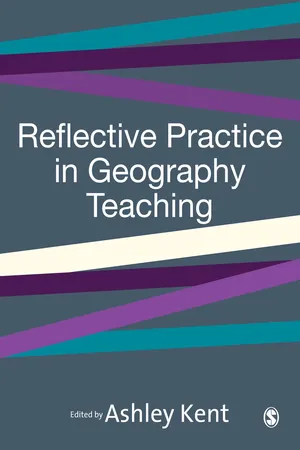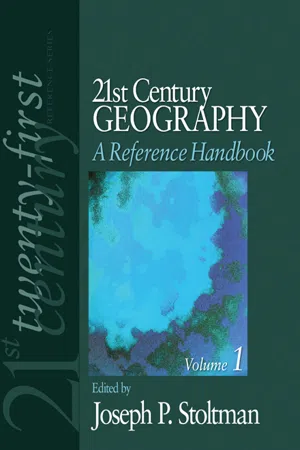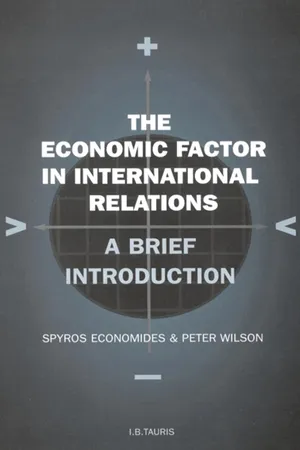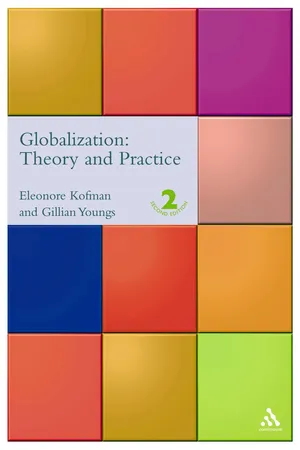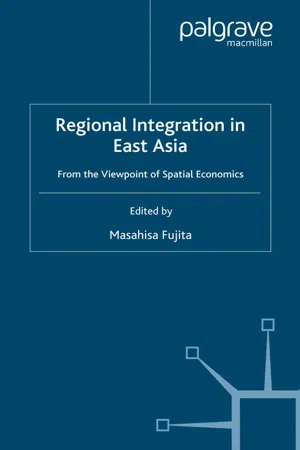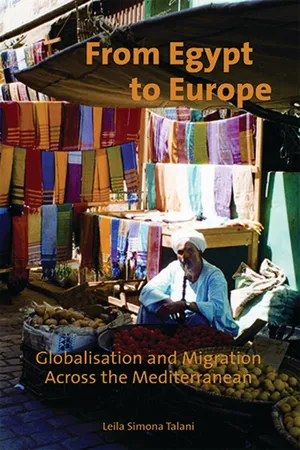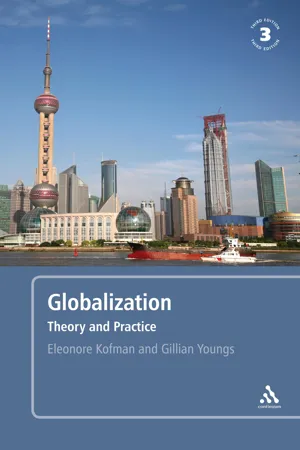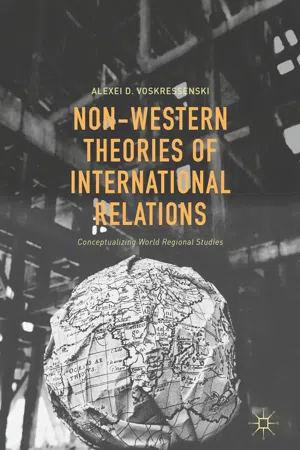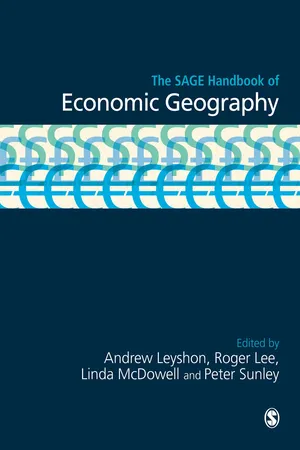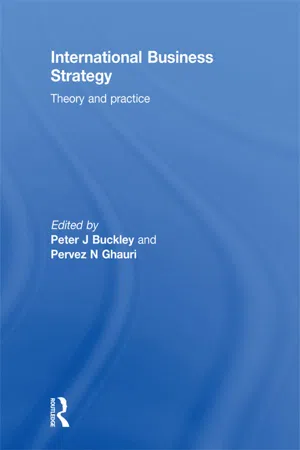Geography
Globalisation
Globalisation refers to the increasing interconnectedness and interdependence of countries and people worldwide, driven by advancements in technology, communication, and trade. It involves the flow of goods, services, capital, and information across national borders, leading to a more integrated global economy and cultural exchange. This phenomenon has significant impacts on various aspects of human life, including economics, politics, and the environment.
Written by Perlego with AI-assistance
Related key terms
1 of 5
10 Key excerpts on "Globalisation"
- eBook - PDF
- Ashley Kent(Author)
- 2000(Publication Date)
- SAGE Publications Ltd(Publisher)
Globalisation refers to processes which increase the scale of social life, and therefore increasingly involve processes which operate across borders at multiple scales. In recent years many commentators – academics, journalists, politicians, activists – have begun to talk about a variety of Globalisations (Anderson, Brook and Cochrane, 1995). Prominent examples include: the spread of financial activity across state borders, as seen in the exit of the pound sterling from the European Exchange Rate Mechanism in 1992 and the ongoing East Asian financial crisis; the near-worldwide take-up of a Reaganite/Thatcherite political ideology in the 1980s; the diffusion of American culture worldwide through products such as Coca-Cola, McDonald’s, MTV and CNN; the increasingly important role of transnational corporations in the world economy; the development of the Internet, a social space which is relatively placeless; and the Globalisation of environmental issues as illustrated through global problems such as the hole in the ozone layer, biodiversity loss and global warming. So, there are multiple Globalisations, some of which seem economic, some political, some cultural and some environmental. However, these multiple Globalisations do have a common denominator, a common denominator which is intrinsically geographical. What all these processes of Globalisation have in common is that they involve an upward shift in the scale of social life, changes in the meaning and porosity of national boundaries and increases in the volume, velocity and importance of cross- border flows, no matter whether these are flows of money, goods, ideas, images or pollutants. In this way, processes of Globalisation lend themselves to geographical analyses. In fact, I would go so far as to say that we cannot understand processes of Globalisation unless we understand their geographies. - eBook - PDF
- Joseph P. Stoltman(Author)
- 2011(Publication Date)
- SAGE Publications, Inc(Publisher)
42 GLOBALIZATION AND GEOGRAPHY ALEX STANDISH Western Connecticut State University G lobalization is a term that gets used to describe many different phenomena. This lack of speci- ficity does not help the process of clarifying how the world has changed over recent years. In this chapter, I will focus on social forces that are driving this change and on the resultant outcomes. I will avoid the tendency to fetishize and treat globalization as some mystical force driving the world in a new direction. Within economics, politics, and culture, there have been many changes since the end of the cold war, and many of them have been global in scale. The changes have been brought about by millions of conscious decisions by people that author Harm de Blij (2009) calls globals. He claims that "globals, whether in government, indus- try, business, or other decision-making capacities, flat- ten playing fields for each other as they traverse the world from Davos to Doha" (p. 7). The globals are accompanied by a second group, the locals. Locals tend to be poorer, the least mobile, and the most susceptible to the impressions of place (p. 7). They are also in the majority of the global population. In this chapter, I discuss globalization and introduce some of the spatial processes that are reshaping the new geography of our world. As geographers, we need to understand the various processes at work (economic, political, and cultural) to comprehend the spatial patterns arising from them. Hence, we will begin with an introduc- tion to the ways in which globalization is approached before discussing globalized economics, globalized poli- tics, and globalized culture. What Is Globalization and Is It New? The term globalization entered the popular vernacular in the late 1980s and early 1990s, from where its usage has ballooned. Especially in the social sciences, this term has become a highly examined phenomenon. - eBook - PDF
The Economic Factor in International Relations
A Brief Introduction
- Spyros Economides, Peter Wilson(Authors)
- 2001(Publication Date)
- I.B. Tauris(Publisher)
Globalisation is a big and amorphous subject. Academic discussion of it takes place within and between many different disciplines, most notably Economics, Geography, Information Technology, International History, International Relations, Management Science and Sociology. The word ‘Globalisation’ has a lot in common with words like ‘im-perialism’ or ‘sovereignty’. It is used in a variety of different ways, in a variety of different contexts, for a variety of different purposes. Within academic debates, one can identify a number of different concepts of Globalisation at work. One can identify a number of different theories about its nature, how it emerged, its significance, the speed with which it is advancing, and its normative implications. But it is also a word of political rhetoric: a word used in actual political debates in order to rally support, win friends and confound enemies. Indeed, the qualities which make it so useful a word politically – its ambiguity and emotiveness – are precisely the qualities that make it so hazardous a word when it comes to serious analysis. A Global Economy? The term ‘global economy’ has entered into the vocabulary of politics with some force. In debates, both popular and specialist, it is increasingly used in preference to its older cousins ‘international/world economy’ and ‘international/world economic system’. The clear implication is that the world has recently become more economically unified, perhaps to the extent that a single ‘global’ economic system CHAPTER 11 Globalisation 177 has emerged, replacing the more fragmented ‘world’ system of regimes that preceded it. This is because ‘global’ suggests one-ness or unity in a way that ‘world’ does not. We can say ‘it’s a diverse world’, but we cannot say ‘it’s a diverse globe’. The former phrase is clear and comprehensible. The latter is awkward and borders on incoherence. - eBook - PDF
Globalization
Theory and Practice Second Edition
- Eleonore Kofman, Gillian Youngs, Eleonore Kofman, Gillian Youngs(Authors)
- 2003(Publication Date)
- Continuum(Publisher)
So much of the rhetoric of the redundancy of geography has been based on the changing role of the state, a limited understanding of its multiple orientations that extend beyond the narrowly economic, and technological determinism. What I want to do in this chapter is to suggest some of the ways in which political geography has made a contribution to a more complex understanding of globalization at the beginning of the twenty-first century as contradictory processes and overlapping and interdependent scales, often generating an unruly world (Herod et aL, 1998). This review is not intended as a comprehensive survey of geographical insights (see Kelly, 1999, for a fuller discussion of theses and counter-discourses), but will focus on some of the recent discussions raised in political economy and critical geopolitics. I will first outline some of the strong claims made for the end of geography as an inevitable process and outcome of contemporary globalization. I will then outline some of the discussions on the meaning of contemporary boundaries and territorialities, and the literature on relativization and jumping of scales that expands the debate beyond the dichotomy of local-global and shows how different scales are overlapping and interdependent. The theorizing of spatial concepts seeks to counteract a homogenizing and homogeneous global level, which has been put on a pedestal and constructed as the undisputed primary unit of analysis, often in a similar 20 ELEONORE KOFMAN way to that previously accorded to the nation-state. Whether the concept in question is border, boundary, place, space or territory, all have to be understood contextually and as historically evolving. - eBook - PDF
Regional Integration in East Asia
From the Viewpoint of Spatial Economics
- Masahisa Fujita(Author)
- 2007(Publication Date)
- Palgrave Macmillan(Publisher)
1 1 Globalization, Regional Integration, and Spatial Economics: An Introduction Masahisa Fujita Globalization and regional integration – an eternal theme With the globalization of economic activity bringing about the expan- sion of markets and deepening of economic interdependency beyond state borders, a new political challenge arises: how to integrate effec- tively the interdependent economies into a harmonious unity through the creation of new super-state institutions? This is the theme of global- ization and integration that has repeatedly arisen throughout the history of civilization. According to A Study of History by Arnold J. Toynbee (1960), for example, the Hellenic civilization, which originated along the Aegean coasts and islands around 1100 BC was confronted with the rising pres- sure of over-population in many city-states from around 700 BC. After many unsuccessful alternative responses such as the disastrous Spartan response of annexing by force the neighbouring lands or the Corinthian response of colonization of overseas lands, this challenge of over-population in the Hellenic society was eventually solved success- fully ‘by increasing the aggregate productivity of the entire Hellenic world through an economic revolution in which subsistence farming (surrounding each city-state) was replaced by cash-crop farming and by industrial production for export in exchange for imports of staple foods and raw materials’ (Toynbee, 1960: 833). This successful response to an economic challenge, however, evoked a further challenge in the political sphere: ‘for the now economically interdependent Hellenic world required a political régime of law and order on an ecumenical scale. The existing régime of parochial city-state dispensations, which had fostered the rise of an autarkic agricultural economy in each iso- lated patch of plain, no longer provided an adequate political structure for a Hellenic society whose economic structure had now come to be unitary’ (ibid.). - eBook - PDF
From Egypt to Europe
Globalisation and Migration Across the Mediterranean
- Leila Simona Talani(Author)
- 2009(Publication Date)
- I.B. Tauris(Publisher)
It is therefore necessary to deepen the perspective by adopting a qualitative de fi nition of Globalisation. 30 FROM EGYPT TO EUROPE From the qualitative point of view, Globalisation is de fi ned as a process comprising a number of qualitative transformations, which in turn characterise the current phase of capitalist development. In this context, Globalisation is identi fi ed as a qualitatively new phenomenon, comprising a number of components all of which converge to de fi ne Globalisation as a process or, as Mittleman suggests, a ‘syndrome’. 7 Moreover, these components tend to spill over into each other, without any predetermined single cause/effect relation but in a dialectical way, which makes it possible to identify the direction of the change, if not to react accordingly. The components included in such a qualitative de fi nition of Globalisation are represented by: technological transformation; fi nancial transformation; geographical reallocation of production; the process of commodi fi cation; the polarisation of wealth; the subordination of politics to economics and the related decline of the nation state; and the emergence of a new global division of labour. 8 The Globalisation thesis on international migration assumes that the State has lost the possibility to control and halt contemporary migratory fl ows, which are the inevitable consequence of the Globalisation process. It is therefore worth analysing the role of the State within Globalisation according to the different perspectives in IPE. 2.1 Globalisation and the State 2.1.1 Realist approaches: The Globalisation myth and the centrality of the State Realist understandings of Globalisation are characterised by a very sceptical attitude towards the very existence of the phenomenon itself, its relevance for the IPE, or its de fi nition as a new historical phase. - eBook - PDF
Globalization, 3rd edition
Theory and Practice
- Eleonore Kofman, Gillian Youngs(Authors)
- 2008(Publication Date)
- Continuum(Publisher)
Too often, globalization is confined to global processes or what POLITICAL GEOGRAPHY AND GLOBALIZATION IN THE TWENTY-FIRST CENTURY 21 Sassen (2006:4) calls 'endogeneity trap' which can be explained simply as a tendency towards growing interdependence. Hence we fail to recognise the ways in which the global may be embedded in the national and emerge from transformations within the nation-state. To understand the historical antecedents of the current neoliberal globalization, Sassen (2006: 168-71) suggests we delve into the earlier redistribution of power inside the state, for ex- ample the growing power of the executive in the 1970s and 1980s which manifested itself earliest in the United States and was a consequence of both national and international politics as well as constitutive of those changes. States are also enablers of globalization while national states organise the tension be- tween globalization and other scales in their own ways (for Japan see Yamazaki, 2002) in a continual pursuit of a spatial fix between the abstract moments of global accumulation and concrete material moments (Jessop, 1999). The state, composed of a heterogeneous ensem- ble through which social and political struggles are worked out, itself promotes interna- tionalization, especially by certain dominant factions. Another type of relationship between the local and the global is provided by local political activists, who though embedded in states, participate in and shape global issues and global change. Social movements in particular often work at the margins of political spaces and are able to jump logics and scales (Staeheli, 1994). Rape, for example, which had been a domestic issue, was propelled onto the international scene through the International War Crimes Tribunal for the former Yugoslavia and recognised as a weapon of war and a crime against humanity (Hyndman, 2004). - eBook - PDF
Non-Western Theories of International Relations
Conceptualizing World Regional Studies
- Alexei D. Voskressenski(Author)
- 2016(Publication Date)
- Palgrave Macmillan(Publisher)
• The maintenance and improvement in human quality of life under urban, suburban, rural, regional or national areas, or the planning of any other urban areas. • The determination of principles and analysis methods to correlate local and regional distinguishing features and global trends in economic development; the detection of a specific local interplay of economic, spatial, political and cultural factors in regional and district develop- ment; the elaboration and drafting of a successful strategy aimed at local, national and regional economic development that blends with strategies and tendencies of global development. • The comprehension of local and regional process intricacies; the rev- elation of weak and strong points in regions and the enhancement of their security and economic competitive power; the understand- ing of inter-linkages between a local place and/or region and their position in the global system of international relations, so that the security measures under discussion would facilitate vibrant economic activity rather than prevent its growth. Partially, these issues are studied by the history and theory of International Relations, International/Global Political Economy, Political Geography, Human Geography, Geo-Economics, Regional Science and some other sociopolitical and socio-economic disciplines. However, in this array of issues and tasks, one can pinpoint central objectives pertaining precisely to World Regional Studies and important (or peripheral) to a different degree for the adjacent disciplines, namely: 1. The analysis of historical paths of the contemporary world-system and its trends of evolution, including tendencies in interrelations between states, economic interdependence of the world, regional options for economic activity and ways of attaining economic prosperity, geo- graphic distinctness of global financial-economic activity, geopolitical 204 A.D. VOSKRESSENSKI - eBook - PDF
- Andrew Leyshon, Roger Lee, Linda McDowell, Peter Sunley, Andrew Leyshon, Roger Lee, Linda McDowell, Peter Sunley, SAGE Publications Ltd(Authors)
- 2011(Publication Date)
- SAGE Publications Ltd(Publisher)
7 The Local in the Global Martin Jones INTRODUCTION How can we think about the ‘local’ in the ‘global’, given that both terms, as Swyngedouw (1997) has suggested, are emi-nently powerful and heavily loaded in our spatial and political vocabularies? Two pos-sible interpretive roads came to mind when thinking about writing this chapter. The first was notions of ‘scale’ and second was the ‘contours of economic development’. The two, I would argue, are interrelated and eco-nomic geographers should have an advantage in explaining this to social and political sci-entists, economists, and even people in the so-called real world. At the time of writing, human geographers have been getting very excited about the pos-sibilities and impossibilities of ‘scale’ (with ‘local’ being one such scale). For political economists of scale, the state responds to the challenges of globalization by reshuffling the hierarchy of spaces in which economic action and intervention occurs (Brenner, 2004). Varieties of localisms and regionalisms are the spatial outcomes of this: sometimes gen-erating new spaces and sometimes reworking old geographies (Brenner et al., 2003). This view of things has been challenged by network theorists, who take issue with the notion that there are bounded spaces to be enacted and managed. They insist on less hierarchical or ‘flatter’ interpretations, which are seen to give open-ended possibilities for geographies of the local (Marston et al., 2005). This ongoing debate will probably settle when all this can be empirically demonstrated. As Harvey (1981) argued when commenting on the turn towards behavioural approaches, there is a language of theory and a language of empirical investigation, and hopefully the two will meet in this instance. My contribution in this chapter cuts across these debates and should thus be read in con-junction with the chapter that follows (Chapter 8). - eBook - ePub
International Business Strategy
Theory and Practice
- Peter J Buckley, Pervez Ghauri, Peter J Buckley, Pervez Ghauri(Authors)
- 2015(Publication Date)
- Routledge(Publisher)
The intention of this paper is to review the literature linking ownership and location strategies to economic geography and theories of Globalisation and to explore new areas of research. The paper focuses on the relationship between the evolving strategies of MNEs, the changing economic geography of the world economy and Globalisation. The first section charts the conflicts between markets and government policies as markets integrate across national borders. Markets are globalised by the actions of MNEs. This is a deliberate process, but it is proceeding at a differential pace in different types of market. The drivers of this process – the location and ownership strategies of MNEs – are examined in the second section. These strategies revolve around the ability of MNEs to subdivide their activities more precisely and to place them in the optimal location. At the same time, more sophisticated and wider control strategies ranging from full ownership to market relationships are used to coordinate global activities. This, it is argued in the third section, makes economic geography more important than ever. Where an activity is placed it interacts with its immediate hinterland and this has profound consequences for changing economic power and development. Finally, the article examines protests against Globalisation that leads to the concluding research agenda.Conflict of markets with national policies in the global economy
As Sideri (1997, 38) says, ‘Globalisation is essentially a process driven by economic forces. Its immediate causes are the spatial reorganisation of production, international trade and the integration of financial markets’. It is not uniform across economic space; ‘the segmentation of the manufacturing process into multiple partial operations, combined with the development of cheap transportation and communication networks, has brought the increasing division of production into separate stages carried out in different locations’. The strategies of multinational firms are crucial to the causes and consequences of Globalisation.We can examine Globalisation as a conflict between markets and management (policies). Figure 8.1 identifies three levels of markets: financial markets, markets in goods and services and labour markets. Each of these is moving at a different speed towards global integration. Financial markets are already very closely integrated internationally, so that no individual ‘national capital markets’ can have a sustainable independent existence. However, attempts at national regulation do persist (Laulajainen, 2000 ) and the role of localities in the financial markets still provides differentiation (Berg and Guisinger, 2001 ; Tickell, 2000 ). Despite this, it is legitimate for analytical purposes to hypothesise a single integrated global capital market. Regional economic integration (REI) is becoming increasingly effective in integrating goods and services markets at the regional level. The relationship between company strategy and policy-making within regional blocs such as the EU is a fascinating area for the development of new research streams (Chapman, 1999 ; Raines and Wishlade, 1999 ; see also, Wood, 2003 on the Industrial Midwest of America). Labour markets, however, are functionally separate at the national level and here integration is largely resisted by national governments (Buckley et al.
Index pages curate the most relevant extracts from our library of academic textbooks. They’ve been created using an in-house natural language model (NLM), each adding context and meaning to key research topics.
